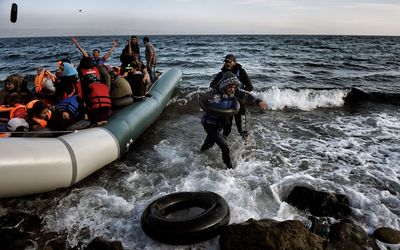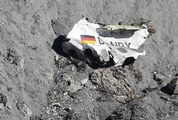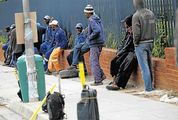OBOCK — Nestled on a stretch of coastline where Africa’s Horn faces the Arabian peninsula, this dusty seaside town has earned a dubious distinction over the past year, becoming one of the few places where refugees fleeing war pass economic migrants speeding the opposite direction — straight into the firefight.
By day, ships carrying scores of Yemeni refugees from conflict between Houthi rebels and the Saudi-backed government dock at Obock’s small port.
After dark, African migrants pile into smaller fishing boats heading to Yemen and, if they make it, jobs cleaning houses or driving taxis in Saudi Arabia.
The numbers travelling in both directions through this sleepy, sunbaked town are rising as Yemen’s war sparks a refugee exodus and a migrant opportunity.
On the outskirts of Obock, a centre to assist migrants — mostly Ethiopians from rural areas stricken by poverty and drought — stands opposite a refugee camp housing more than 3,000 Yemenis, a 10th of the total the government says have transited through Djibouti.
Neither refugees nor migrants want to stay in an outpost that feels like the end of the earth, where drab cement houses and a mosque look onto a long trash-strewn beach. Yemeni refugees with means immediately head to the capital, hoping to continue to the US or Europe. The African migrants sail to Yemen as soon as they can.
The travellers are transforming the economy and the rhythm of life here.
Aid agencies say escalating conflict is drawing more Yemeni refugees and convincing desperate migrants the chaos will ease their path to economic security in Saudi Arabia.
Obock’s intersection shows how Djibouti has quietly emerged as a crossroads for those escaping poverty and conflict.
The town’s transformation shows how the swell of displaced people is lapping at the world’s most remote corners, plugging isolated regions into the global economy and sometimes recalibrating the identity of a nation.
"It’s extraordinary that a lot of people are trying to flee Yemen and a lot of people are trying to get into Yemen at the same time," said Tom Kelly, US ambassador to Djibouti.
"It’s just a very dramatic illustration of the ongoing migration and refugee crises besetting the world."
Djibouti, a hot, barren former French colony of 900,000 desperately poor people, has long served as a transit hub.
Located on the trade route between the Red Sea and the Gulf of Aden, it houses US and French military bases.
The strategic location has also made it a nexus of people fleeing in every direction.
A surge in arrivals from Yemen last year lifted the country’s formal refugee population — which also includes refugees from former regional conflicts — to about 22,000, according to the United Nations’ refugee agency, although an official with the interior ministry said they believed the actual number was closer to 40,000.
Obock’s refugee camp is filled with people who could not get jobs in the capital or ran out of money.
Gassar Gohory, a psychology teacher from Yemen’s second city, Aden, arrived nine months ago and feels trapped.
"It’s not good here," he said, but he is out of money, and going back to Yemen is not an option: "Snipers in Aden killed many of my friends."
The refugees have been good for the town’s economy. Many came with savings and rented houses or opened shops and restaurants. Some young Yemeni men rent motorised rickshaws and ferry people between the camp and the centre of town for a small fee.
Aid money has arrived in the refugees’ wake. The UN’s refugee agency allocated about 30% of its aid in a country like Djibouti to improving the local community, said Abdulrahman Mnawar, a field officer with the agency in Obock.
UN funds, for example, had paid for hospital improvements, he said.
The migrants — Ethiopians and a few Somalis and Eritreans — come over land, braving hundreds of miles of desert to get here.
Many arrive in organised groups, while some young men travel alone, carrying a water bottle and tossing a T-shirt over their heads to keep off the blazing sun.
Migrants had trickled through here in small numbers for many years, but the numbers had jumped to 50 a day as the war had intensified, the Obock office of the International Organisation for Migration (IOM) said.
An estimated 100,000 such migrants crossed Djibouti each year, said the Danish Refugee Council, which works with migrants and refugees in the country.
At Obock’s port, some migrants can be seen relaxing under acacia trees as they wait for boats. Some said they left because of poverty, others because of government repression.
A young Ethiopian man named Tajir Ibrahim said he had gone to Saudi Arabia once and returned home two years ago when Ethiopia’s president put out an appeal to the diaspora.
But he failed to find work back in Ethiopia, and after he used his savings to build a house, the police destroyed the building after telling him the government owned the land.
"I lost my money, my house and there was nothing left," Mr Ibrahim said.
He paid a smuggler to get him to Yemen and planned to pick up odd jobs after that, or beg if needed. It is what he did last time.
He said he was aware of the fighting in Yemen, but that he expected to get through because the war "is not about us".
A mother of three named Hayat Mohammed said there was no money for her in Ethiopia and therefore no future for her children. She said the risk was worth it.
Her children were back in Ethiopia and she said she would send money home to them. "I am not afraid. I heard that in Yemen there are people getting killed. But I am going anyway," Ms Mohammed said.
Areas of instability often become stops on the illegal migrant trail.
Libya became a key transit point for Africans trying to reach Europe partly because of the insecurity there.
But in Yemen, migrants are running into a well-sealed Saudi border and end up stranded in Yemen; often beaten by smugglers or turned over to traffickers.
"The moment they embark on those boats and they cross the Gulf of Aden, it goes out of their hands," said International Organisation for Migration field officer Ali Aljefri.
The increase in migrants has meant more money for local fishermen who transport migrants and smugglers, but the local government says they are a serious drain on resources — they have nothing and they defecate on the beach.
Plenty of migrants run out money and get stuck in Obock, sleeping in the streets and taking odd jobs in exchange for food.
Djibouti’s stability in a restive region has long made it a natural place for people to seek sanctuary, but the dramatic rise in numbers is bringing new strains.
The capital city, also named Djibouti, is overwhelmed by migrants and refugees seeking work.
While the government says it is committed to stopping the illegal migrants, people stream across the country undisturbed, many dying of thirst or heatstroke en route.
Some migrants said they passed the bodies of those who did not make it as they walked to Obock.
"Djibouti is not a country with extreme riches. We don’t have petrol. We have truly, budgetary restrictions even though we want to give aid to refugees," said Sirag Omar Abdoulkader, secretary-general at the interior ministry.
One of Obock’s newest restaurants — run by a Yemeni refugee who serves grilled fish by the port — exemplifies the vast waiting room the town has become.
The owner says he tried to persuade his Ethiopian workers to stay in Djibouti and avoid the war in his homeland but they are determined to go.
"They tell me, ‘There is a war. Wait until it stops,’" said Ethiopian Abdi Ibrahim, who works at the restaurant.
Barely surviving in Obock, he makes less than $2 a day and sleeps on the ground outside a local mosque.
"I’ll go anyway. I will face my destiny."
More Africa news from The Wall Street Journal
More news from The Wall Street Journal
Premium access to WSJ.com: $1 a week for 12 weeks

Refugees and migrants arrive on the Greek island of Lesbos after crossing the Aegean Sea from Turkey. Picture: AFP
OBOCK — Nestled on a stretch of coastline where Africa’s Horn faces the Arabian peninsula, this dusty seaside town has earned a dubious distinction over the past year, becoming one of the few places where refugees fleeing war pass economic migrants speeding the opposite direction — straight into the firefight.
By day, ships carrying scores of Yemeni refugees from conflict between Houthi rebels and the Saudi-backed government dock at Obock’s small port.
After dark, African migrants pile into smaller fishing boats heading to Yemen and, if they make it, jobs cleaning houses or driving taxis in Saudi Arabia.
The numbers travelling in both directions through this sleepy, sunbaked town are rising as Yemen’s war sparks a refugee exodus and a migrant opportunity.
On the outskirts of Obock, a centre to assist migrants — mostly Ethiopians from rural areas stricken by poverty and drought — stands opposite a refugee camp housing more than 3,000 Yemenis, a 10th of the total the government says have transited through Djibouti.
Neither refugees nor migrants want to stay in an outpost that feels like the end of the earth, where drab cement houses and a mosque look onto a long trash-strewn beach. Yemeni refugees with means immediately head to the capital, hoping to continue to the US or Europe. The African migrants sail to Yemen as soon as they can.
The travellers are transforming the economy and the rhythm of life here.
Aid agencies say escalating conflict is drawing more Yemeni refugees and convincing desperate migrants the chaos will ease their path to economic security in Saudi Arabia.
Obock’s intersection shows how Djibouti has quietly emerged as a crossroads for those escaping poverty and conflict.
The town’s transformation shows how the swell of displaced people is lapping at the world’s most remote corners, plugging isolated regions into the global economy and sometimes recalibrating the identity of a nation.
"It’s extraordinary that a lot of people are trying to flee Yemen and a lot of people are trying to get into Yemen at the same time," said Tom Kelly, US ambassador to Djibouti.
"It’s just a very dramatic illustration of the ongoing migration and refugee crises besetting the world."
Djibouti, a hot, barren former French colony of 900,000 desperately poor people, has long served as a transit hub.
Located on the trade route between the Red Sea and the Gulf of Aden, it houses US and French military bases.
The strategic location has also made it a nexus of people fleeing in every direction.
A surge in arrivals from Yemen last year lifted the country’s formal refugee population — which also includes refugees from former regional conflicts — to about 22,000, according to the United Nations’ refugee agency, although an official with the interior ministry said they believed the actual number was closer to 40,000.
Obock’s refugee camp is filled with people who could not get jobs in the capital or ran out of money.
Gassar Gohory, a psychology teacher from Yemen’s second city, Aden, arrived nine months ago and feels trapped.
"It’s not good here," he said, but he is out of money, and going back to Yemen is not an option: "Snipers in Aden killed many of my friends."
The refugees have been good for the town’s economy. Many came with savings and rented houses or opened shops and restaurants. Some young Yemeni men rent motorised rickshaws and ferry people between the camp and the centre of town for a small fee.
Aid money has arrived in the refugees’ wake. The UN’s refugee agency allocated about 30% of its aid in a country like Djibouti to improving the local community, said Abdulrahman Mnawar, a field officer with the agency in Obock.
UN funds, for example, had paid for hospital improvements, he said.
The migrants — Ethiopians and a few Somalis and Eritreans — come over land, braving hundreds of miles of desert to get here.
Many arrive in organised groups, while some young men travel alone, carrying a water bottle and tossing a T-shirt over their heads to keep off the blazing sun.
Migrants had trickled through here in small numbers for many years, but the numbers had jumped to 50 a day as the war had intensified, the Obock office of the International Organisation for Migration (IOM) said.
An estimated 100,000 such migrants crossed Djibouti each year, said the Danish Refugee Council, which works with migrants and refugees in the country.
At Obock’s port, some migrants can be seen relaxing under acacia trees as they wait for boats. Some said they left because of poverty, others because of government repression.
A young Ethiopian man named Tajir Ibrahim said he had gone to Saudi Arabia once and returned home two years ago when Ethiopia’s president put out an appeal to the diaspora.
But he failed to find work back in Ethiopia, and after he used his savings to build a house, the police destroyed the building after telling him the government owned the land.
"I lost my money, my house and there was nothing left," Mr Ibrahim said.
He paid a smuggler to get him to Yemen and planned to pick up odd jobs after that, or beg if needed. It is what he did last time.
He said he was aware of the fighting in Yemen, but that he expected to get through because the war "is not about us".
A mother of three named Hayat Mohammed said there was no money for her in Ethiopia and therefore no future for her children. She said the risk was worth it.
Her children were back in Ethiopia and she said she would send money home to them. "I am not afraid. I heard that in Yemen there are people getting killed. But I am going anyway," Ms Mohammed said.
Areas of instability often become stops on the illegal migrant trail.
Libya became a key transit point for Africans trying to reach Europe partly because of the insecurity there.
But in Yemen, migrants are running into a well-sealed Saudi border and end up stranded in Yemen; often beaten by smugglers or turned over to traffickers.
"The moment they embark on those boats and they cross the Gulf of Aden, it goes out of their hands," said International Organisation for Migration field officer Ali Aljefri.
The increase in migrants has meant more money for local fishermen who transport migrants and smugglers, but the local government says they are a serious drain on resources — they have nothing and they defecate on the beach.
Plenty of migrants run out money and get stuck in Obock, sleeping in the streets and taking odd jobs in exchange for food.
Djibouti’s stability in a restive region has long made it a natural place for people to seek sanctuary, but the dramatic rise in numbers is bringing new strains.
The capital city, also named Djibouti, is overwhelmed by migrants and refugees seeking work.
While the government says it is committed to stopping the illegal migrants, people stream across the country undisturbed, many dying of thirst or heatstroke en route.
Some migrants said they passed the bodies of those who did not make it as they walked to Obock.
"Djibouti is not a country with extreme riches. We don’t have petrol. We have truly, budgetary restrictions even though we want to give aid to refugees," said Sirag Omar Abdoulkader, secretary-general at the interior ministry.
One of Obock’s newest restaurants — run by a Yemeni refugee who serves grilled fish by the port — exemplifies the vast waiting room the town has become.
The owner says he tried to persuade his Ethiopian workers to stay in Djibouti and avoid the war in his homeland but they are determined to go.
"They tell me, ‘There is a war. Wait until it stops,’" said Ethiopian Abdi Ibrahim, who works at the restaurant.
Barely surviving in Obock, he makes less than $2 a day and sleeps on the ground outside a local mosque.
"I’ll go anyway. I will face my destiny."
More Africa news from The Wall Street Journal
More news from The Wall Street Journal
Premium access to WSJ.com: $1 a week for 12 weeks




















Change: 0.40%
Change: 0.47%
Change: -0.49%
Change: 0.53%
Change: 1.03%
Data supplied by Profile Data
Change: 1.71%
Change: 1.28%
Change: 0.40%
Change: 0.00%
Change: 1.64%
Data supplied by Profile Data
Change: -1.27%
Change: 0.00%
Change: 0.05%
Change: -0.08%
Change: 0.35%
Data supplied by Profile Data
Change: -0.02%
Change: 0.21%
Change: -0.06%
Change: 0.53%
Change: 0.70%
Data supplied by Profile Data